General, Sir John Monash, Personal Files Book 19, 7 July - 30 July 1918- Part 6
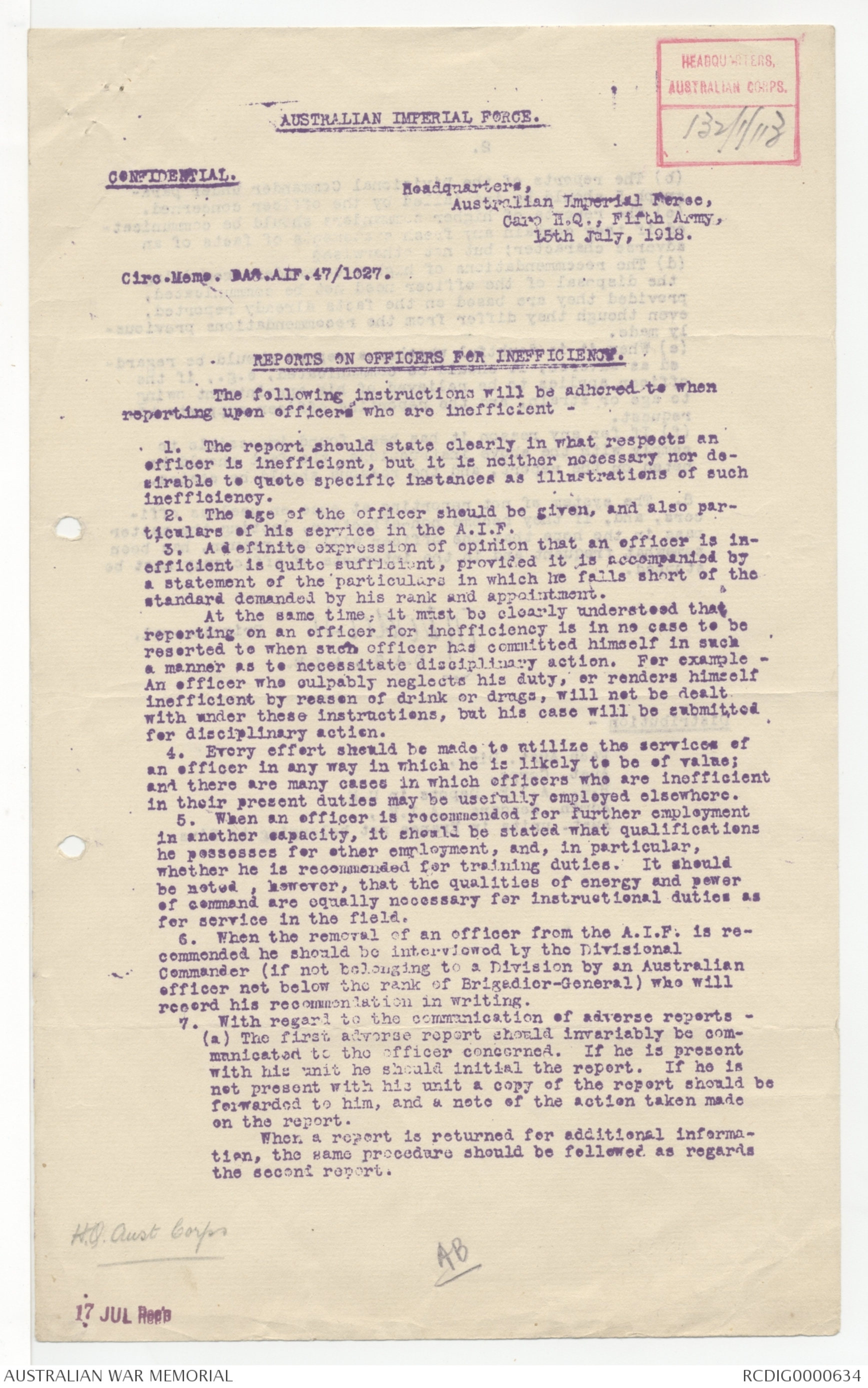
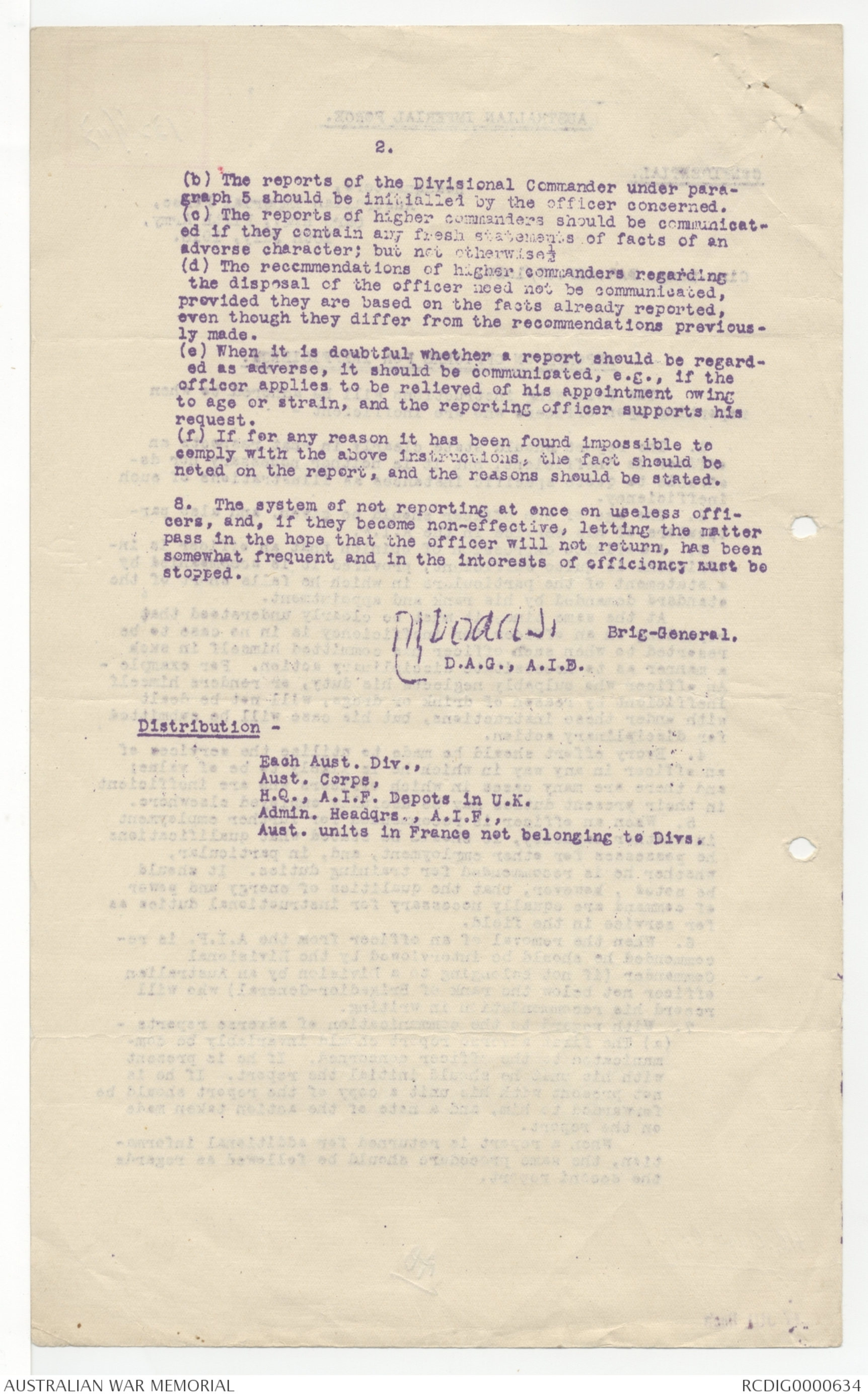
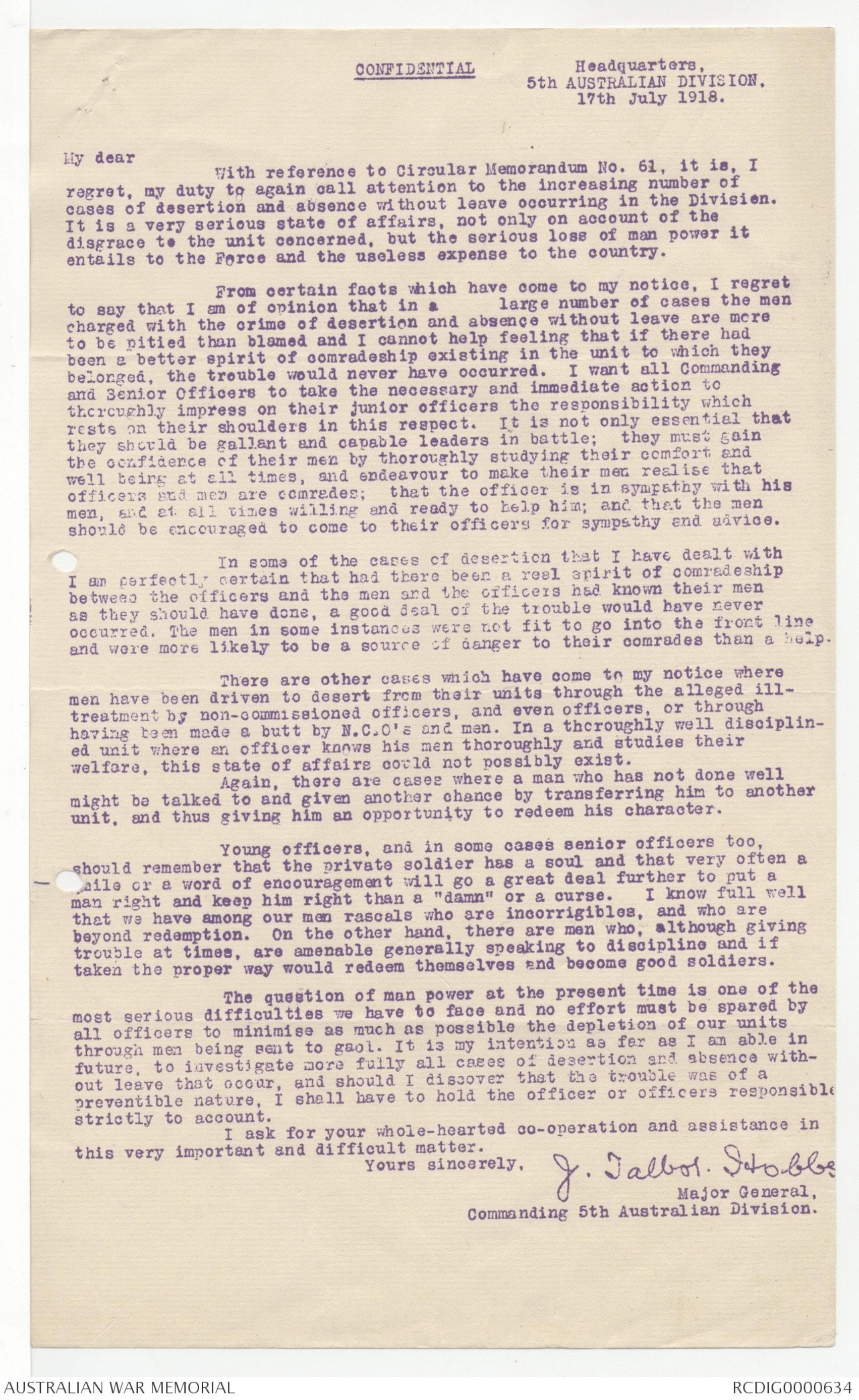
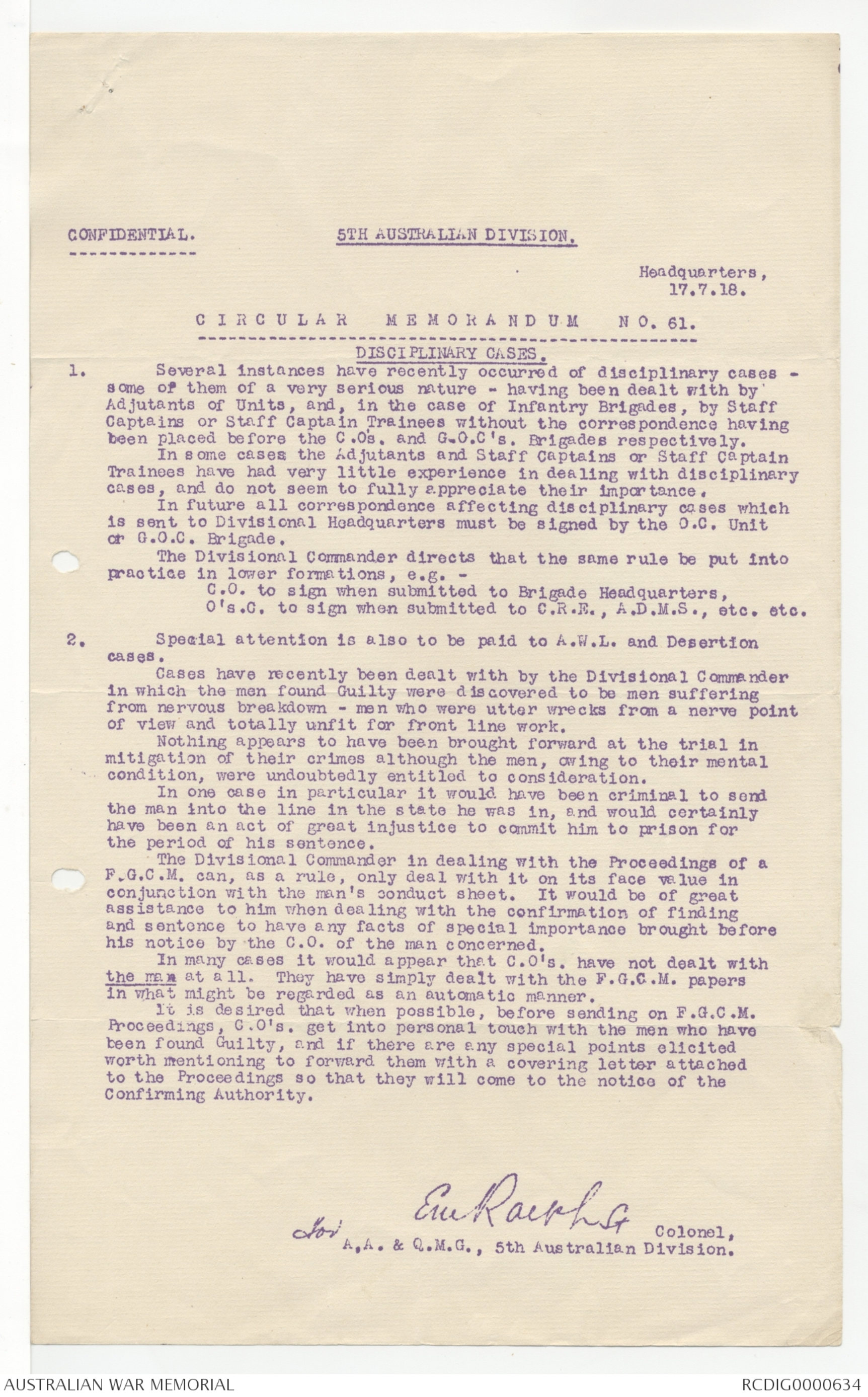
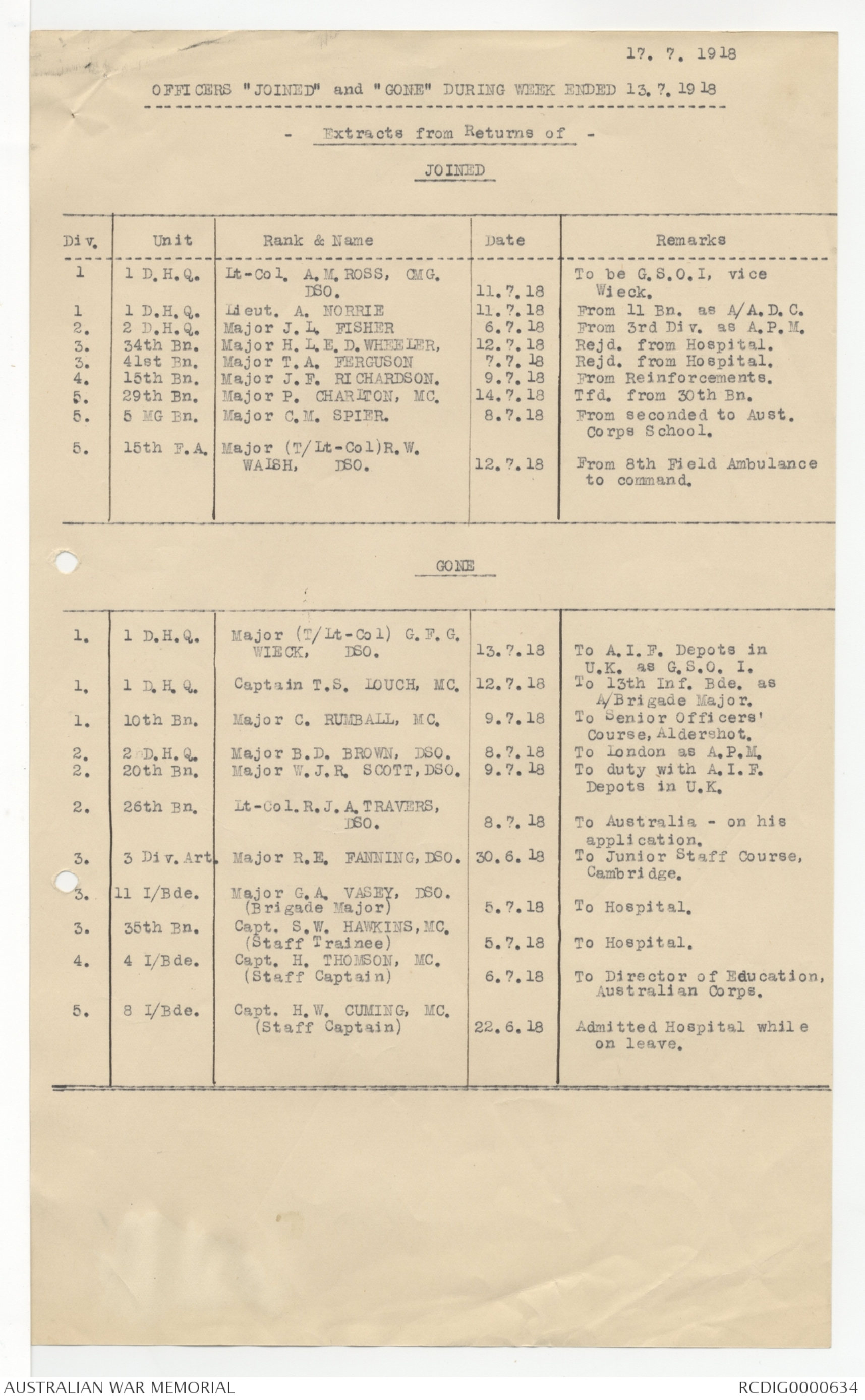
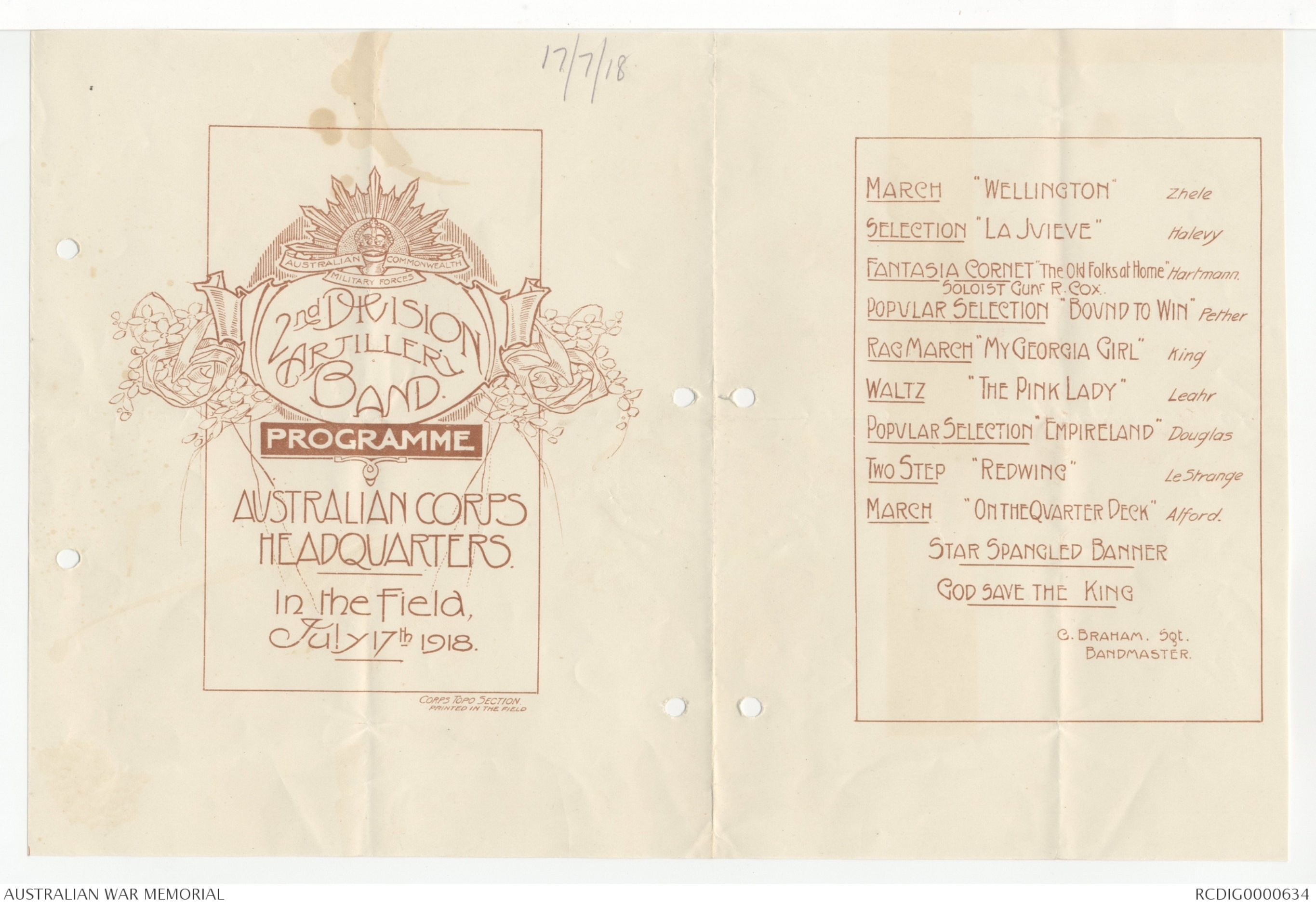
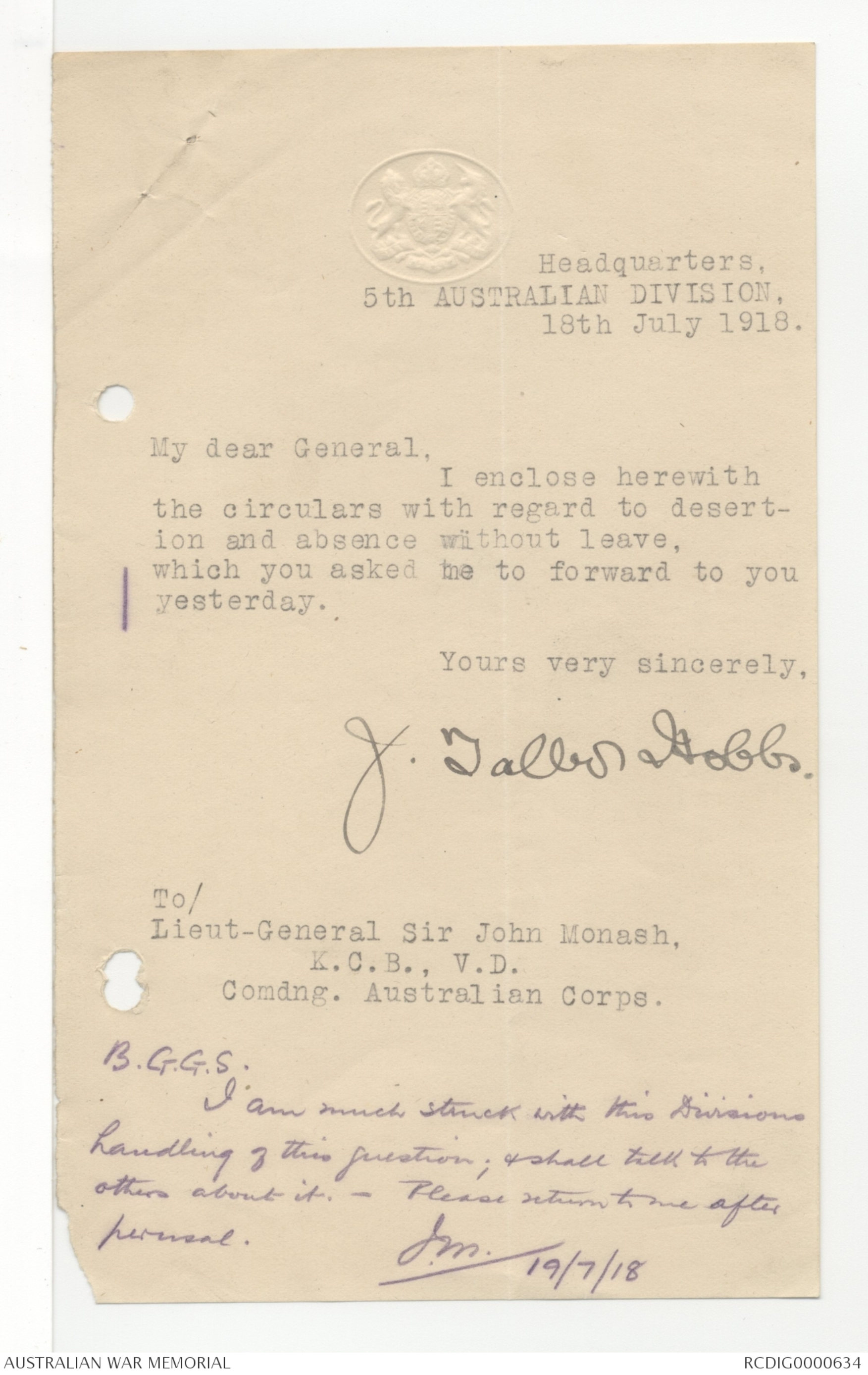
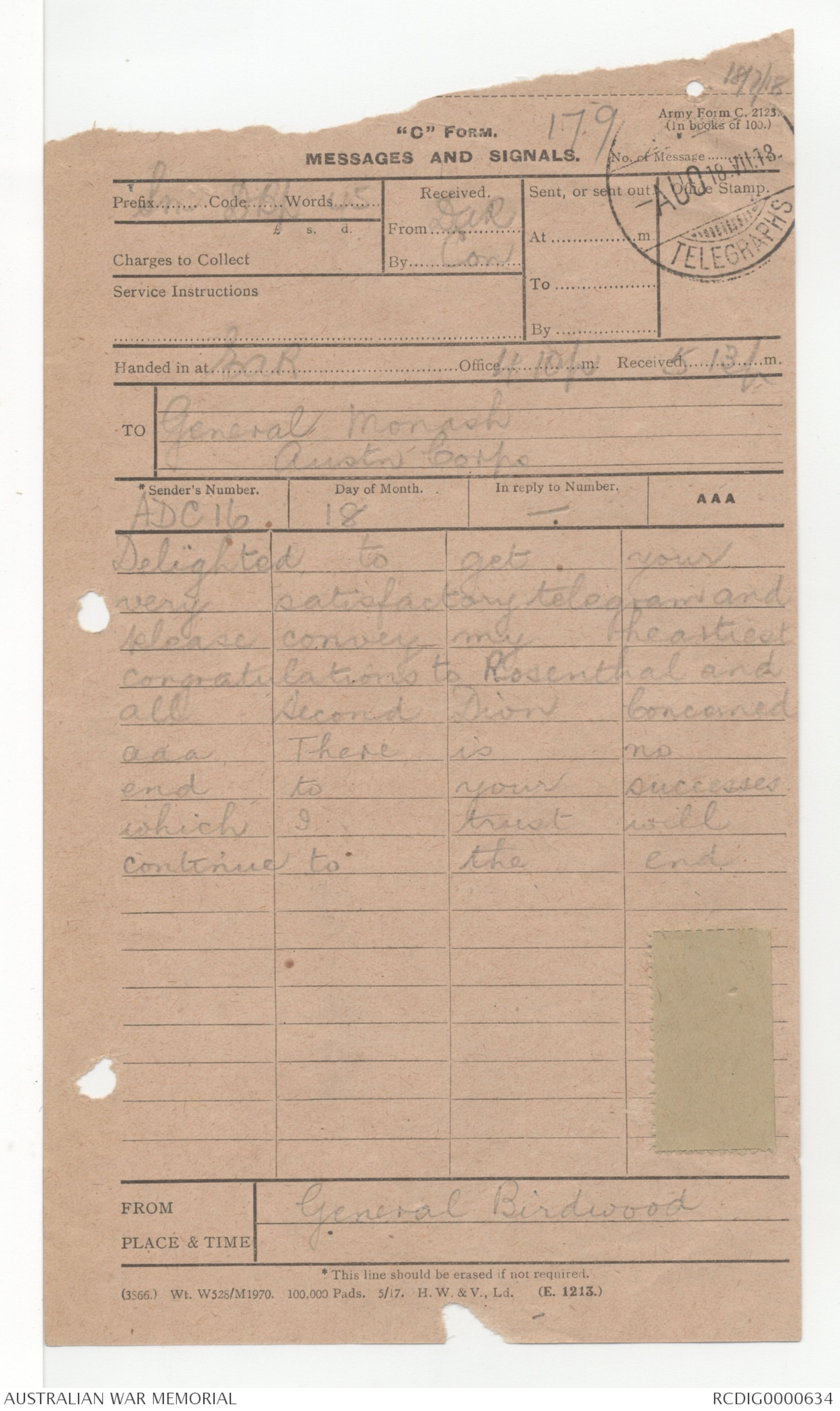
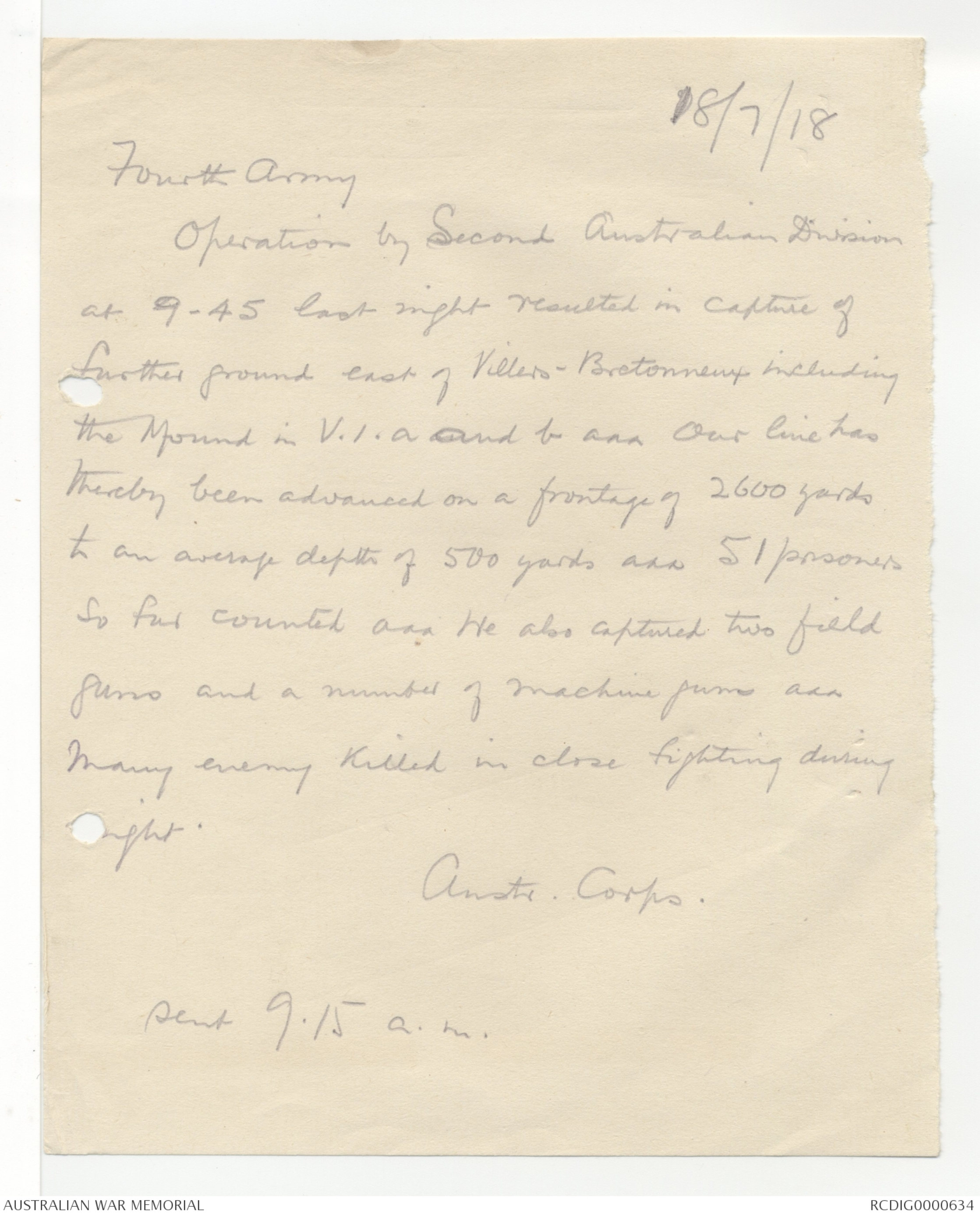
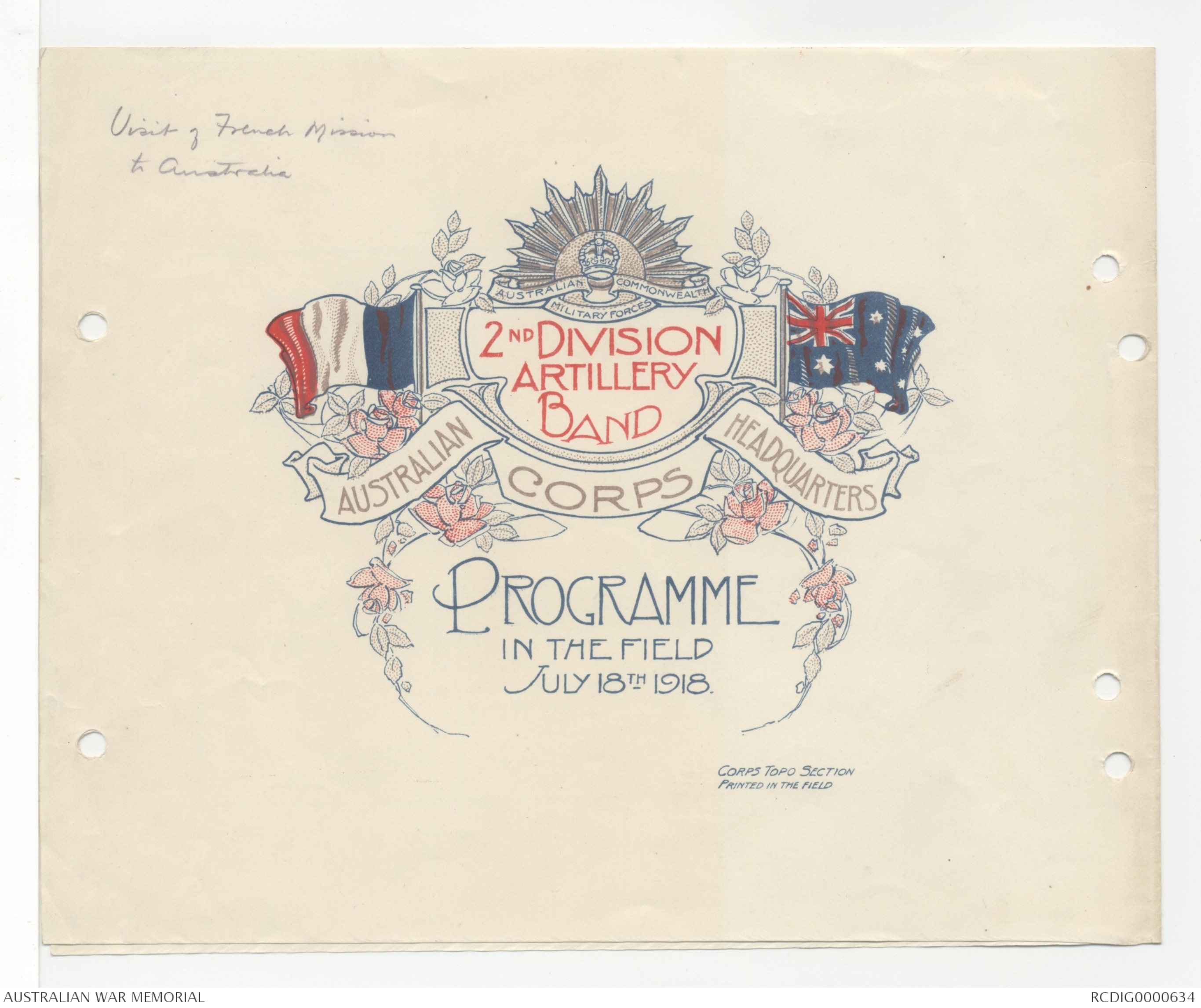
[*HEADQUARTERS.
AUSTRALIAN CORPS.
132/1/113*]
AUSTRALIAN IMPERIAL FORCE.
CONFIDENTIAL.
Headquarters,
Australian Imperial Force,
Cairo H.Q., Fifth Army,
15th July, 1918.
Circ. Memo. DAG. AlF.47/1027.
REPORTS ON OFFICERS FOR INEFFICIENCY.
The following instructions vill be adhered to when
reporting upon officers who are inefficient -
1. The report should state clearly in what respects an
officer is inefficient, but it is neither necessary nor desirable
to quote specific instances as illustrations of such
inefficiency.
2. The age of the officer should be given, and also particulars
of his service in the A.I.F.
3. A definite expression of opinion that an officer is inefficient
is quite sufficient, provided it is accompanied by
a statement of the particulars in which he falls short of the
standard demanded by his rank and appointment.
At the same time, it mast be clearly understood that
reporting on an officer for inefficiency is in no case to be
resorted to when such officer has committed himself in such
a manner as to necessitate disciplinary action. For example
An officer who culpably neglects his duty, or renders himself
inefficient by reason of drink or drugs, will not be dealt.
with under these instructions, but his case will be submitted
for disciplinary action.
4. Every effort should be made to utilize the services of
an officer in any way in which he is likely to be of value;
and there are many cases in which officers who are inefficient
in their present duties may be usefully employed elsewhere.
5. When an officer is recommended fer further employment
in another capacity, it should be stated what qualifications
he possesses for other employment, and, in particular,
whether he is recommended for training duties. It should
be noted, however, that the qualities of energy and power
of command are equally necessary fer instructional duties
for service in the field.
6. When the removal of an officer from the A.I.F. is recommended
he should be interviewed by the Divisional
Commander (if not belonging to a Division by an Australian
officer not below the rank of Brigadier-General) who will
record his recommendation in writing.
7. With regard to the communication of adverse reports
(a) The first adverse report should invariably be communicated
to the officer concerned. If he is present
with his unit he should initial the report. If he is
not present with his unit a copy of the report should be
forwarded to him, and a note of the action taken made
on the report.
When a report is returned for additional information,
the same procedure should be followed as regards
the second report.
H.Q. Aust Corps
AB
17 JUL. Rec'd
2.
(b) The reports of the Divisional Commander under paragraph
5 should be initialled by the officer concerned.
(c) The reports of higher commanders should be communicated
if they contain any fresh statements of facts of an
adverse character; but not otherwise.
(d) The recommendations of higher commanders regarding
the disposal of the officer need not be communicated,
provided they are based on the facts already reported,
even though they differ from the recommendations previously
made.
(c) When it is doubtful whether a report should be regarded
as adverse, it should be communicated, e.g., if the
officer applies to be relieved of his appointment owing
to age or strain, and the reporting officer supports his
request.
(f) If for any reason it has been found impossible to
comply with the above instructions, the fact should be
noted on the report, and the reasons should be stated.
8. The system of not reporting at once on useless officers,
and, if they become non-effective, letting the matter
pass in the hope that the officer will not return, has been
somewhat frequent and in the interests of efficiency, must be
stopped.
J Monash
Brig-General.
D.A.G., A.I.DF.
Distribution -
Each Aust. Div.,
Aust. Corps,
H.Q., A.I.F. Depots in U.K.
Admin. Headqrs., A.I.F.,
Aust. units in France not belonging to Divs.
CONFIDENTIAL
Headquarters,
5th AUSTRALIAN DIVISION,
17th July 1918.
My dear
With reference to Circular Memorandum No. 6l, it is, I
regret, my duty to again call attention to the increasing number of
cases of desertion and absence without leave occurring in the Division.
It is a very serious state of affairs, not only on account of the
disgrace to the unit concerned, but the serious loss of man power it
entails to the Force and the useless expense to the country.
From certain facts which have come to my notice, I regret
to say that I am of opinion that in a large number of cases the men
charged with the crime of desertion and absence without leave are more
to be pitied than blamed and I cannot help feeling that if there had
been a better spirit of comradeship existing in the unit to which they
belonged, the trouble would never have occurred. I want all Commanding
and Senior Officers to take the necessary and immediate action to
thoroughly impress on their junior officers the responsibility which
rests on their shoulders in this respect. It is not only essential that
they should be gallant and capable leaders in battle; they must gain
the confidence of their men by thoroughly studying their comfort and
well being at all times, and endeavour to make their men realise that
officers and men are comrades; that the officer is in sympathy with his
men, and at all times willing and ready to help him; and that the men
should be encouraged to come to their officers for sympathy and advice.
In some of the cases of desertion that I have dealt with
I am perfectly certain that had there been a real spirit of comradeship
between the officers and the men and the officers had known their men
as they should have done, a good deal of the trouble would have never
occurred. The men in some instances were not fit to go into the front line
and were more likely to be a source of danger to their comrades than a help.
There are other cases which have come to my notice where
men have been driven to desert from their units through the alleged ill-treatment
by non-commissioned officers, and even officers, or through
having been made a butt by N.C.O's and men. In a thoroughly well disciplined
unit where an officer knows his men thoroughly and studies their
welfare, this state of affairs could not possibly exist.
Again, there are cases where a man who has not done well
might be talked to and given another chance by transferring him to another
unit, and thus giving him an opportunity to redeem his character.
Young officers, and in some cases senior officers too,
should remember that the private soldier has a soul and that very often a
smile or a word of encouragement will go a great deal further to put a
man right and keep him right than a "damn" or a curse. I know full well
that we have among our men rascals who are incorrigibles, and who are
beyond redemption. On the other hand, there are men who, although giving
trouble at times, are amenable generally speaking to discipline and if
taken the proper way would redeem themselves and become good soldiers.
The question of man power at the present time is one of the
most serious difficulties we have to face and no effort must be spared by
all officers to minimise as much as possible the depletion of our units
through men being sent to gaol. It is my intention as far as I am able in
future, to investigate more fully all cases of desertion and absence without
leave that occur, and should I discover that the trouble was of a
preventible nature, I shall have to hold the officer or officers responsible
strictly to account.
I ask for your whole-hearted co-operation and assistance in
this very important and difficult matter.
Yours sincerely,
J Talbot Hobbs
Major General,
Commanding 5th Australian Division.
CONFIDENTIAL.
5TH AUSTRALIAN DIVISION.
Headquarters,
17.7.18.
CIRCULAR MEMORANDUM NO. 61.
DISCIPLINARY CASES
1. Several instances have recently occurred of disciplinary cases -
some of them of a very serious nature - having been dealt with by
Adjutants of Units, and, in the case of Infantry Brigades, by Staff
Captains or Staff Captain Trainees without the correspondence having
been placed before the C.O's. and G.O.C's. Brigades respectively.
In some cases the Adjutants and Staff Captains or Staff Captain
Trainees have had very little experience in dealing with disciplinary
cases, and do not seem to fully appreciate their importance.
In future all correspondence affecting disciplinary cases which
is sent to Divisional Headquarters must be signed by the O.C. Unit
or G.O.C. Brigade.
The Divisional Commander directs that the same rule be put into
practice in lower formations, e.g. -
C.O. to sign when submitted to Brigade Headquarters
O's.C. to sign when submitted to C.R.E., A.D.M.S., etc. etc.
2. Special attention is also to be paid to A.W.L. and Desertion
cases.
Cases have recently been dealt with by the Divisional Commander
in which the men found Guilty were discovered to be men suffering
from nervous breakdown - men who were utter wrecks from a nerve point
of view and totally unfit for front line work.
Nothing appears to have been brought forward at the trial in
mitigation of their crimes although the men, owing to their mental
condition, were undoubtedly entitled to consideration.
In one case in particular it would have been criminal to send
the man into the line in the state he was in, and would certainly
have been an act of great injustice to commit him to prison for
the period of his sentence.
The Divisional Commander in dealing with the Proceedings of a
F.G.C.M. can, as a rule, only deal with it on its face value in
conjunction with the man's conduct sheet. It would be of great
assistance to him when dealing with the confirmation of finding
and sentence to have any facts of special importance brought before
his notice by the C.O. of the man concerned.
In many cases it would appear that C.O's. have not dealt with
the man at all. They have simply dealt with the F.G.C.M. papers
in what might be regarded as an automatic manner.
It is desired that when possible, before sending on F.G.C.M.
Proceedings, C.O's. get into personal touch with the men who have
been found Guilty, and if there are any special points elicited
worth mentioning to forward them with a covering letter attached
to the Proceedings so that they will come to the notice of the
Confirming Authority.
E M Ralph Lt
for Colonel,
A,A. & Q.M.G., 5th Australian Division
17. 7. 1918
OFFICERS "JOINED" and "GONE" DURING WEEK ENDED 13. 7. 1918
- Extracts from Returns of -
JOINED
|
Div. |
Unit |
Rank & Name |
Date |
Remarks |
| 1 | 1 D.H.Q. | Lt-Col. A. M. ROSS, CMG. DSO. |
11.7.18 |
To be G.S.O.I, vice Wieck. |
| 1 | 1 D.H.Q. | Lieut. A. NORRIE |
11.7.18 |
From 11 Bn. as A/A.D.C. |
| 2. | 2 D.H.Q. | Major J. L. FISHER |
6.7. 18 |
From 3rd Div. as A.P.M. |
| 3. | 34th Bn. | Major H. L. E. D. WHEELER, |
12.7.18 |
Rejd. from Hospital. |
| 3. | 41st Bn | Major T. A. FERGUSON |
7.7. 18 |
Rejd. from Hospital. |
| 4. | 15th Bn. | Major J. F. RICHARDSON. |
9.7. 18 |
From Reinforcements. |
| 5. | 29th Bn. | Major P. CHARLTON, MC. |
14.7.18 |
Tfd. from 30th Bn. |
| 5. | 5 MG Bn. | Major C. M. SPIER. |
8.7.18 |
From seconded to Aust. Corps School. |
| 5. | 15th F.A | Major (T/Lt-Col) R. W. WALSH, DSO. |
12.7.18 |
From 8th Field Ambulance to command. |
GONE
|
Div. |
Unit |
Rank & Name |
Date |
Remarks |
| 1. | 1 D.H.Q. | Major (T/Lt-Col) G. F. G. WIECK, DSO |
13.7.18 |
To A.I.F. Depots in U.K. as G.S.O. I. |
| 1. | 1 D.H.Q. | Captain T. S. LOUCH, MC |
12.7.18 |
To 13th Inf. Bde. As A/Brigade Major. |
| 1. | 10th Bn. | Major C. RUMBALL, MC. |
9.7. 18 |
To Senior Officers Course, Aldershot. |
| 2. | 2 D.H.Q. | Major B. D. BROWN, DSO. |
8.7.18 |
To London as A.P.M. |
| 2. | 20th Bn. | Major W. J. R SCOTT, DSO |
9.7. 18 |
To duty with A.I.F. Depots in U.K. |
| 2. | 26th Bn. | Lt-Col. R. J. A. TRAVERS, DSO. |
8.7. 18 |
To Australia - on his application. |
| 3. | 3 Div. Art | Major R. E. FANNING, DSO. |
30.6.18 |
To Junior Staff Course, Cambridge. |
| 3. | 11 I/Bde. | Major G. A VASEY, DSO. (Brigade Major) |
5.7.18 |
To Hospital. |
| 3. | 35th BN. | Capt. S. W. HAWKINS, MC. (Staff Trainee) |
5.7.18 |
To Hospital. |
| 4. | 4 I/Bde. | Capt. H. THOMSON, MC. (Staff Captain) |
6.7.18 |
To Director of E Australian Corps. |
| 5. | 8 I/Bde. | Capt. H. W. CUMING, MC. (Staff Captain) |
22.6.18 |
Admitted Hospital while on leave. |
17/7/18
2nd DIVISION
ARTILLERY
BAND.
PROGRAMME
AUSTRALIAN CORPS
HEADQUARTERS
In the Filed,
July 17th 1918.
MARCH "WELLINGTON" Zhele
SELECTION "LA JUIEVE" Halvey
FANTASIA CORNET "That Old Folks at Home" Hartman
SOLOIST Gunr R Cox.
POPULAR SELECTION "BOUND TO WIN" Pether
RAG MARCH "MYGEORGIA GIRL" King
WALTZ "THE PINK LADY" Leahr
POPULAR SELECTION "REDWING" LeStrange
TWO STEP ONTHE QUARTER DECK" Alford.
STAR SPANGLED BANNER
GOD SAVE THE KING
B. BRAHAM. Sgt.
BANDMASTER
Headquarters,
5th AUSTRALIAN DIVISION,
18th July 1918.
My dear General,
I enclose herewith
the circulars with regard to desertion
and absence without leave,
which you asked me to forward to you
yesterday
Yours very sincerely,
J. Talbot Hobbs.
To/
Lieut-General Sir John Monash,
K.C.B., V. D.
Comdng. Australian Corps.
[*B.G.G.S.
I am much struck with this Divisions
handling of the question; & shall talk to the
others about it. - Please return to me after
perusal.
J.M.
19/7/18*]
[*18/7/18*]
[*179*]
[*AUO 18.Vii.18_
TELEGRAMS/*]
MESSAGES AND SUGNALS
Prefix Sn Code DBL Words 45
Recerived.
From DAR
By Conl
Handed in at DAR Office 410p m Received 5 13p m
To General Monash
Austn Corps
#Sender's Number. Day of Month. In reply to Number. AAA
ADC16. 18 –
Delighted to get your
very satisfactory telegram and
please convey my heartiest
congratulations to Rosenthal and
all Second Divn concerned
aaa These is no
end to your successes
which I trust will
continue to the end
FROM
General Birdwood
218/7/18
Fourth Army
Operations by Second Australian Division
at 79-45 last night resulted in capture of
further ground east of Villers-Bretonneaux including
the Mound in V.I.a and b aaa Our line has
thereby been advanced on a frontage of 2600 yards
to an average depth of 500 yards aaa 51 prisoners
so far counted aaa We also captured two field
guns and a number of machine guns aaa
Many enemy killed in close fighting during
night.
Austr. Corps.
sent 9.15 a.m.
[*Visit of French Mission
to Australia*]
Programme cover - see original document
 Sam scott
Sam scottThis transcription item is now locked to you for editing. To release the lock either Save your changes or Cancel.
This lock will be automatically released after 60 minutes of inactivity.